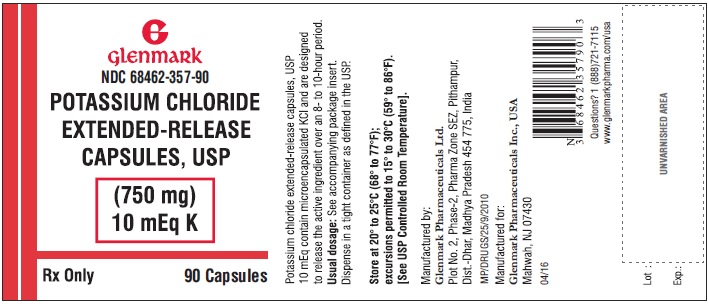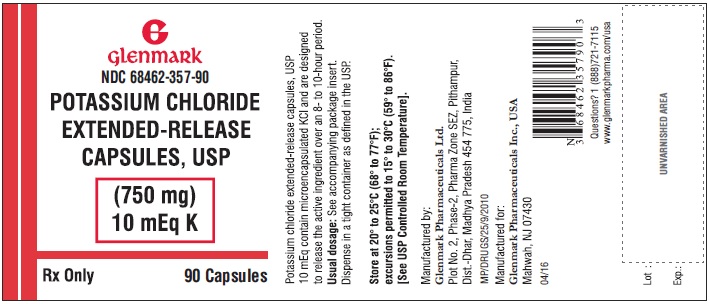Label: POTASSIUM CHLORIDE capsule, extended release
- NDC Code(s): 68462-357-01, 68462-357-05, 68462-357-90
- Packager: Glenmark Pharmaceuticals Inc., USA
- Category: HUMAN PRESCRIPTION DRUG LABEL
- DEA Schedule: None
- Marketing Status: Abbreviated New Drug Application
Drug Label Information
Updated April 29, 2016
If you are a consumer or patient please visit this version.
- Download DRUG LABEL INFO: PDF XML
- Official Label (Printer Friendly)
-
SPL UNCLASSIFIED SECTIONRx Only
-
DESCRIPTIONPotassium chloride extended-release capsules, USP, 10 mEq is an oral dosage form of microencapsulated potassium chloride containing 750 mg of potassium chloride USP equivalent to 10 mEq of ...
-
CLINICAL PHARMACOLOGYPotassium ion is the principal intracellular cation of most body tissues. Potassium ions participate in a number of essential physiological processes, including the maintenance of intracellular ...
-
INDICATIONS AND USAGEBECAUSE OF REPORTS OF INTESTINAL AND GASTRIC ULCERATION AND BLEEDING WITH CONTROLLED-RELEASE POTASSIUM CHLORIDE PREPARATIONS, THESE DRUGS SHOULD BE RESERVED FOR THOSE PATIENTS WHO CANNOT TOLERATE ...
-
CONTRAINDICATIONSPotassium supplements are contraindicated in patients with hyperkalemia since a further increase in serum potassium concentration in such patients can produce cardiac arrest. Hyperkalemia may ...
-
WARNINGSHyperkalemia - (see OVERDOSAGE) In patients with impaired mechanisms for excreting potassium, the administration of potassium salts can produce hyperkalemia and cardiac arrest. This occurs ...
-
PRECAUTIONSGeneral - The diagnosis of potassium depletion is ordinarily made by demonstrating hypokalemia in a patient with a clinical history suggesting some cause for potassium depletion. In interpreting ...
-
ADVERSE REACTIONSOne of the most severe adverse effects is hyperkalemia (see CONTRAINDICATIONS, WARNINGS, ANDOVERDOSAGE). Gastrointestinal bleeding and ulceration have been reported in patients treated with ...
-
OVERDOSAGEThe administration of oral potassium salts to persons with normal excretory mechanisms for potassium rarely causes serious hyperkalemia. However, if excretory mechanisms are impaired or if ...
-
DOSAGE AND ADMINISTRATIONThe usual dietary intake of potassium by the average adult is 50 to 100 mEq per day. Potassium depletion sufficient to cause hypokalemia usually requires the loss of 200 or more mEq of potassium ...
-
HOW SUPPLIEDPotassium chloride extended-release capsules, USP, 10 mEq are hard gelatin capsules with opaque white body with ‘357’ imprinted in black and opaque orange cap with ‘G’ imprinted in black, each ...
-
PACKAGE/LABEL PRINCIPAL DISPLAY PANEL

-
INGREDIENTS AND APPEARANCEProduct Information

